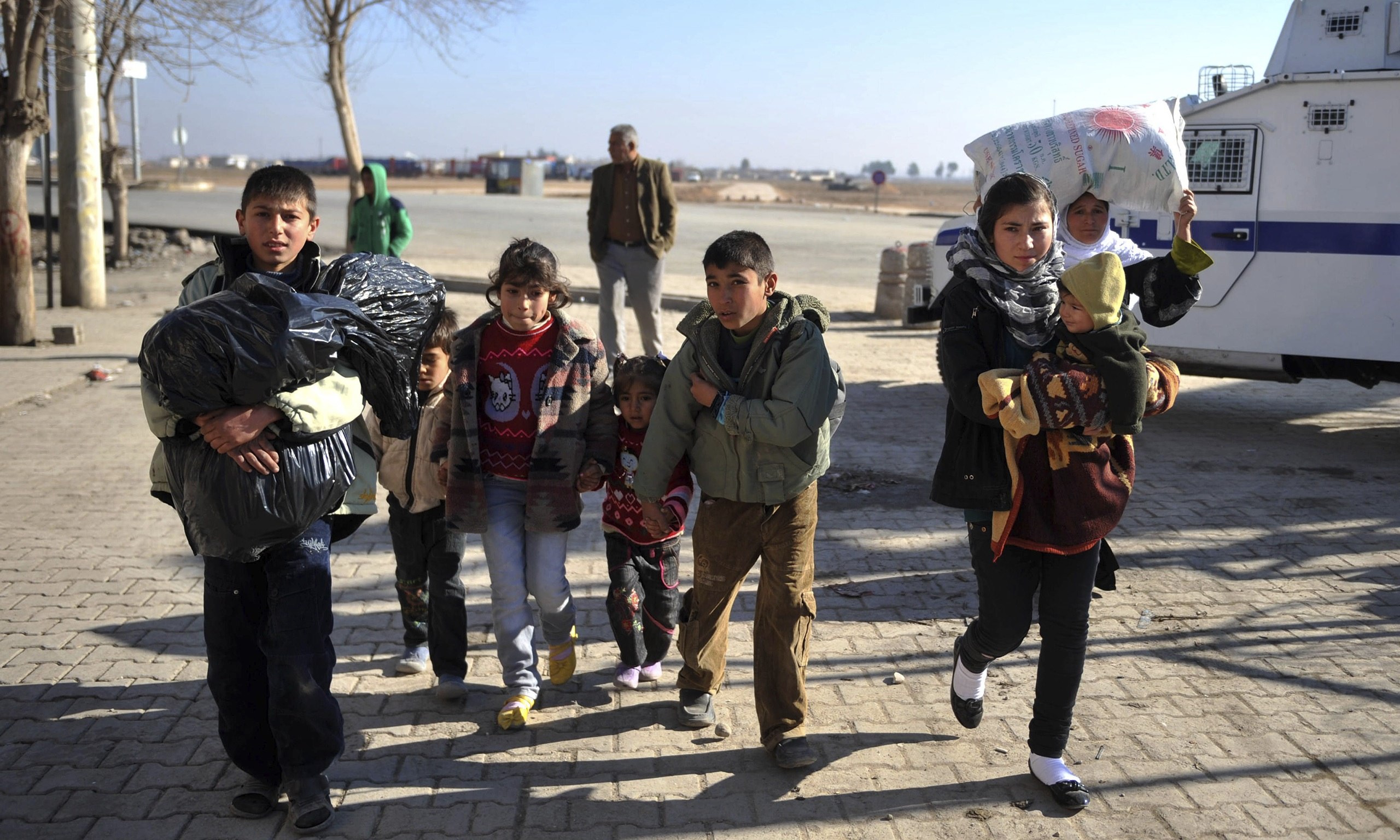Syria’s humanitarian crisis must be addressed by Turkey
written for The Spectator, 16 January 2014

Newly arrived Syrian refugees cross into Turkey
On Tuesday morning, Turkish police in the border cities of Kilis and Gaziantep arrested 25 people on suspicion of aiding Jihadi fighters in neighbouring Syria, including two said to be high ranking Al Qaeda operatives. Seven Conservative MPs had flown out of Gaziantep less than twenty-four hours previously. I was with them, meeting with Syrian opposition leaders and observing Turkish efforts to house the refugees flowing across the border.
Most of those arrested have links to the IHH, a religious organization repeatedly accused of terrorism offenses by US politicians, and behind the ‘flotilla’ attempt to break Israel’s blockade on Gaza in 2010. But in Turkey, the IHH is both legal and popular, and it’s indisputable that it carries out genuine charitable efforts among the poor. On Saturday night, two minutes were all it took me to walk from the parliamentary delegation’s hotel to an IHH fundraising stall in the central square of Gaziantep, Istanbul’s sixth largest city. The large banners proclaim that they’re fundraising for humanitarian aid to starving Syrian children. But Gaziantep’s residents are in little doubt that many of the funds end up in the hands of Islamist fighters.
And over the border, it’s clear that extremist forces are gathering strength. In Syria, anti-Assad forces are fracturing and turning on themselves, with fierce fighting between Al Qaeda-backed ISIS and the allegedly liberal Free Syrian Army. So as I watched Free Syrian Army representatives beg British MPs to give them weaponry, they had an uphill struggle to convince the delegation that any such weapons would stay out of the hands of extremists, who recently captured several FSA warehouses.
In one meeting, Aleppo commander Colonel Aloquaidi swore to us to offer himself for execution if any weapons under his command were captured by terrorists. So far, so inspiring. But like so many in the travelling road show of opposition representatives who regularly meet western leaders in safe countries, it’s hard to tell if Colonel Aloquaidi speaks for anyone on the ground in Syria. He’s a hardened fighter of the ground war, and the British-based Syrians-in-exile who guided us worked hard to convince us of his authority. One advocate of greater British involvement in Syria even tried to persuade me that Aloquaidi spoke as Head of the Supreme Military Council in Aleppo. But in fact Aloquaidi resigned from the allied command in late 2013 and now leads his men independently. Fighters I spoke to by telephone still in Aleppo or recently fled from Homs felt little connection to Interim Prime Minister Ahmed Tumeh, whom we also met, and who has been living in exile for most of the war. Those from Homs prefer football hero Abdul Baset Al-Sarout, the Beckham of civil war.
This Friday, the Syrian National Council, which Tumeh leads, will vote on whether to attend the Geneva 2 round of talks later this month. Western powers are determined the talks must go ahead. For the Council, it means sitting down with Assad, the man they insist must step down for any peace deal to work. And it’ll be hard for Tumeh to sell peace talks to soldiers in the thick of the fighting unless they’re accompanied by a lifting of the siege conditions at Homs, where Assad’s forces have blockaded six hundred families for more than five hundred days.
This humanitarian disaster is no longer merely Syria’s problem. The latest Turkish official figures suggest that 600,000 refugees have crossed into the country, but unofficial suggestions are as high as 1.3 million. Many flee their homes without identity papers, so find illegal places to cross the border or bribe border guards. The Turks appear to be doing a good job in a difficult situation: they’ve spent $2 billion dollars of their own budget on housing refugees, receiving only $200 million in international assistance. Yet the influx is bound to have economic effects. Gaziantep is a boom city, with plenty of industrial agriculture which needs cheap labour. But a healthily Turkish labourer in the region could earn 900 Turkish Lira a month before the civil war. Now a Syrian refugee is lucky if he earns 300L for the same work. And that’s before you meet twelve-year-old boys like my new friend Suleyman, a Syrian Kurd who earns 30L a week working all day in a restaurant instead of going to school.
As Turkey deliberates as to whether to join the EU, the economic impact of events in Gaziantep will matter more and more in London. The West can ill afford more political instability in a partner. Last November, Turkey’s ruling AK Party has joined the AECR, the anti-federalist grouping of conservative parties in the European Parliament, of which the Conservative Party has been a member since Cameron became leader. If Cameron is to genuinely negotiate a looser relationship between London and Brussels, it will be with the support of alliances like this one – AK Party’s link with the AECR suggests it would only agree to join an EU that scaled down its federalist ambitions. But before then, Turkey needs to either integrate its refugee population, or address the much less likely task of building a Syria to which they can safely return. Given that both Turks and Syrians in Gaziantep are determined that refugee camp children be educated in Arabic, rather than in Turkish, integration has a long way to go.




